-
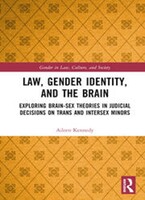
This book challenges law’s reliance on neurology’s brain-sex binary. The brain has become the latest candidate in a historical search for a reliable and fixed biological marker of ‘true sex’ that has permeated every aspect of Western culture, including law. As definitions of the sexed and gendered body have become ever more contentious, the development and dissemination of brain-sex theories have come to dominate popular understanding of LGBTI+ identities. But, this book argues, the brain is no more helpful than earlier biological measures in ensuring just outcomes. Examining how law determines and differentiates ‘male’ and ‘female’ in two contested areas of sexed identity –through a discussion of Australian cases authorising medical interventions to alter the embodied sex characteristics of transgender minors and intersex minors –the book demonstrates an incoherence in the legal understanding of gender identity development. As the brain too fails as a convincing biological anchor for the binary sex categories of male and female, law must, it is argued, retreat from its aspiration to create, define, and regulate artificially bounded sex categories of male and female.
-
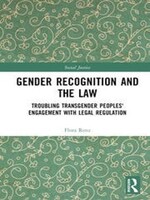
The Gender Recognition Act (GRA) has often been described as a groundbreaking and progressive legal framework for allowing people to legally change their gender. This book seeks to challenge this representation by drawing on in-depth qualitative interviews with trans people about the GRA. Theoretically this book uses the concepts of legal consciousness, agency and emotion to highlight the normative underpinnings of the GRA. Overall, the book contends, the GRA does not accurately reflect many trans people's own understanding of their gender identity or their sexuality. It is designed to create subjects that govern their behaviour and self-expression in a way that aligns with a purely binary model of sex/gender and sexuality. Although a deviation from these norms does not incur any direct punishment, it indirectly leads to a denial of rights and legal protections. By reviewing relevant legislation and case law, and through qualitative research, the book establishes how, instead of uncritically accepting or completely rejecting the GRA, trans people enact their singular identities by engaging strategically with law.
-
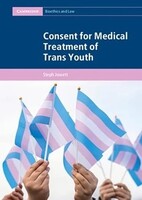
Access to medical treatment for trans youth occupies a haphazard and dynamic legal landscape. In this comprehensive scholarly analysis of the historical and current legal principles, Steph Jowett examines the medico-legal nexus of regulation of this healthcare in Australia and in England and Wales. This is informed by an in-depth discussion of the medical literature on treatment for trans youth, including clinical guidelines, the outcomes of treatment and outcomes for trans youth who are unable to be treated. With illustrative examples and clear language, Jowett argues that legal barriers to clinical practice should be congruent with and reflect the current state of medical knowledge. Not only does Jowett assess the extent to which key legal decisions have been consistent with medical knowledge in the past, but she offers a nuanced, comparative perspective that will inform reform efforts in the future.
-
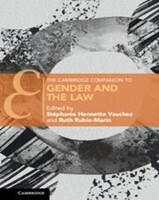
To what extent is the legal subject gendered? Using illustrative examples from a range of jurisdictions and thematically organised chapters, this volume offers a comprehensive consideration of this question. With a systematic, accessible approach, it argues that law and gender work to co-produce the legal subject. Cumulatively, the volume's chapters provide a systematic evaluation of the key facets of the legal subject: the corporeal, the functional and the communal. Exploring aspects of the legal subject from the ways in which it is sexed and sexualised to its national and familial dimensions, this volume develops a complete account of the various processes through which legal orders produce gendered subjects. Across its chapters, each theoretically ambitious in its own right, this volume outlines how the law not only acts on the social world, but genders it.
-
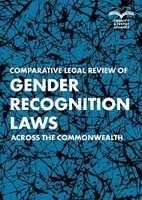
This report outlines international and regional human rights standards for recognising gender identity and expression and provides a comparative analysis of legal gender recognition laws in seven Commonwealth countries – New Zealand, Malaysia, India, Namibia, South Africa, Guyana and Malta. The report explores how these seven geographically diverse jurisdictions approach gender identity and analyses the different legislative models of recognising self-identified gender, from models of self-determination (Malta) to surgery-focused requirements (Namibia), and from a broad spectrum of amendment orientated procedures (India) to a country without any gender recognition process (Guyana). The report concludes by drawing out broad themes from the country case studies and providing a set of practical general recommendations for legal reform.
-
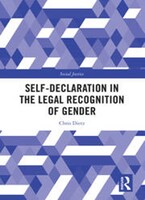
Self-Declaration in the Legal Recognition of Gender examines the impact of legislation premised upon the principle of ‘self-declaration’ of legal gender status. Existing doctrinal and comparative analyses have tended to come out strongly in favour of, or against, self-declaration. This book offers a socio-legal alternative which focuses on how self-declaration is experienced, on an embodied level, by trans and gender diverse people. It presents research conducted in Denmark, which became the first European state to adopt self-declaration in June 2014. By analysing Danish law through a Foucauldian framework which brings together socio-, feminist, and trans legal scholarship on embodiment and jurisdiction, the book offers the first empirically based and theoretically informed analysis of self-declaration. It draws upon legal consciousness, affect theory, vulnerability, and governmentality literatures to argue that the jurisdictional boundaries which existed between law and medicine were maintained throughout the reform process. This limited the impact of the legislation, enabling access to health care to be restricted in the same year in which amending legal gender status was liberalised. As the list of states that have adopted self-declaration increases, this intervention offers activists and policymakers insights which might shape how they respond to similar reform proposals in the future.
-

From our television screens to the ballot box, transgender people have suddenly become part of the zeitgeist. This apparently overnight emergence, though, is just the latest stage in a long and varied history. Trans Britain chronicles this journey in the words of those who were there to witness a marginalised community grow into the visible phenomenon we recognise today: activists, film-makers, broadcasters, parents, an actress, a rock musician and a priest, among many others.
-
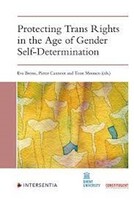
Over the last decade, trans rights and gender variation as legal and a human rights issues have been high on the international and national agendas. Improved registration of and attention for gender variation and gender incongruence is accompanied by attention for the often far-reaching requirements that trans persons have to comply with in order to obtain legal recognition of their actual gender identity. A small but rapidly growing number of (mostly European and South American) States have recently reformed their legal frameworks of gender recognition by allowing trans persons to change their official sex registration on the basis of gender self-determination. Against that background, this book brings together international experts to discuss questions and challenges relating to the legal articulation of the emerging right to gender self-determination and its consequences for law and society, such as the future of sex/gender registration and the protection of trans persons against discrimination. Given the importance of State practice for the development of the right to gender self-determination and its implementation in law, particular attention is given to the national contexts of Belgium, Germany and Norway. These three countries may be perceived as world leaders in protecting trans rights, and therefore noteworthy 'laboratories' for future State practice.
-
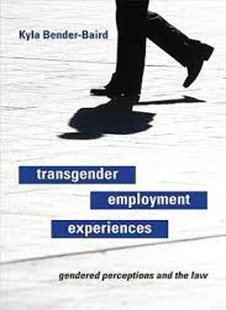
Using personal interviews, legal case histories, and transgender theory, Transgender Employment Experiences combines policy analysis with the lived experiences of twenty transgender-identified employees, showing how worker protections that should exist under the Civil Rights Act are instead systematically undermined in the case of many transgender employees. Rather than focusing solely on negative experiences, however, Kyla Bender-Baird also highlights the positive experiences her respondents had coming out at work, illustrating examples of best practices in response to transitioning. Bender-Baird covers many forms of discrimination that transgender workers face, such as harassment, gender-based dress codes, income-related inequities, bathroom policies, and background checks. Drawing from this analysis, she argues for protections for gender expression in policy decisions, legislative efforts, and for a multipronged approach to workplace discrimination.










